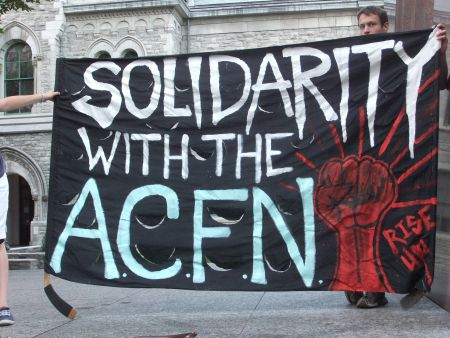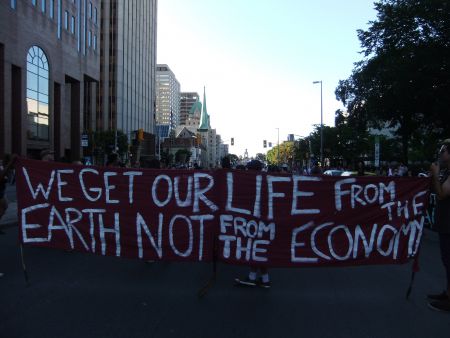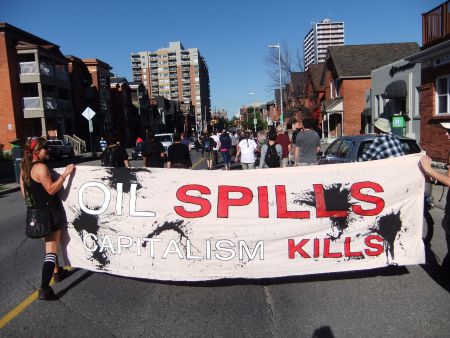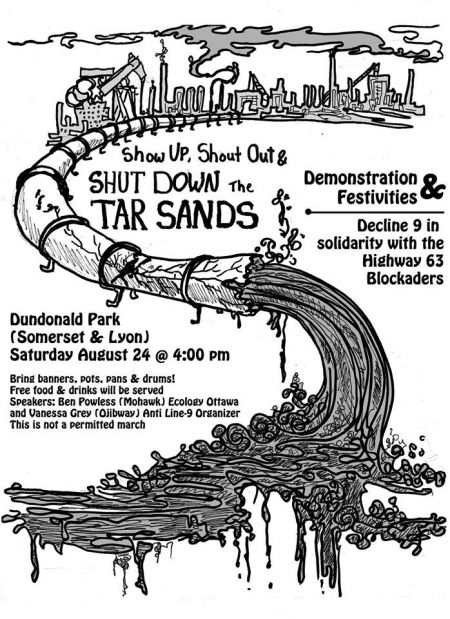The world’s largest oil extraction mega-project in Alberta’s tar sands is turning Canada into a pariah state with the worst climate performance in the western world.
Tar sands expansion has brought attempted pipeline expansion, and resistance.
On August 24th, residents of Ottawa-Gatineau rallied in support of the Athabasca Chipewyan First Nation (ACFN) whose territories have been devastated by tar sands development.
“This event is being organized in solidarity with a protest that was originally called for August 24th by First Nations in Alberta,” according to Ben Powless, a community organizer with Ecology Ottawa.
The ACFN plan to block Highway 63, the mega-project’s main artery for workers and equipment.
Despite the blockade being postponed until October, a number of rallies are proceeding in Ontario and elsewhere to express opposition to the proposed pipelines, said Powless.
The pipelines in question are Enbridge’s Line 9 and TransCanada Corp.’s Energy East pipeline.
Line 9 was originally built in 1976 between Sarnia and Montreal and, according to experts, cannot withstand flows of diluted bitumen from the tar sands. The very similar Enbridge Line 6B pipeline ruptured over the Kalamazoo River in Michigan in 2010 spilling 6.3 million litres of tar sands crude.
Enbridge plans to pipe diluted bitument east through Line 9 have been met with numerous protests including a six-day occupation of the Westover pumping station outside Hamilton in late June, resulting in arrests, court appearances, and further protests.
Energy East would bring 1.1 million barrels per day of tar sands oil through Ottawa and over the Rideau River to Quebec and New Brunswick.
“The pipeline is all risk and no reward for the city and residents of Ottawa,” said Powless. “Any spill could have devastating impacts on our farmlands, the Rideau River, and even on our drinking water.”
The pipelines are opposed by thousands of residents and local politicians who want to decrease dependency on fossel fuels, tar sands expansion, and climate change.
According to Oil Sands Reality Check campaign, emissions have doubled in the past decade and are set to double again as industry and government facilitate tar sands expansion to produce 5 million barrels of oil per day.
According to Environment Canada, current expansion plans would result in emissions production reaching 104 million tonnes of carbon dioxide by 2020, higher than the combined emissions of 85 countries.
“We’re already faced in many of our communities that are fighting the tar sands, life and death situations as a result of climate change, and as a result of living in such close proximity to the world’s dirtiest fossil fuel development,” said Clayton Thomas-Muller with the Indigenous Tar Sands Campaign during an August 21st teleconference with the Draw the Line on Keystone XL Pipeline campaign.
Pipeline proposals through Indigenous territories in the province of British Columbia were met with vows to block construction and the projects have been shelved, forcing industry and government to set their sights south and east to reach ports in the Gulf of Mexico and Atlantic Ocean.
Thousands of Americans have put their bodies on the line in many US states, forcing President Obama to balk on green-lighting the Keystone XL pipeline.
Frequent oil spills in Canada and the US have also hindered proponents’ efforts, despite an extensive campaign by the Harper Conservatives to market the toxic crude as “ethical” to the world.
Meanwhile, Canadian federal taxpayers provide $1.38 billion per year in subsidies to the tar sands, according to the Oil Sands Reality Check campaign.
According to Powless, “The pipelines are a fundamental part of the expansion of the tar sands megaproject, which means that if we can effectively block the pipelines as a means of getting oil out of Alberta, we also have a chance to slow down or stop the expansion of the tar sands themselves and the local and global devastation implied by that.”




